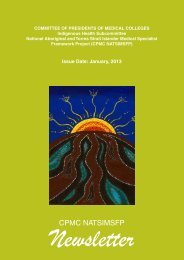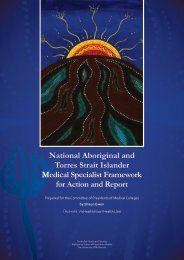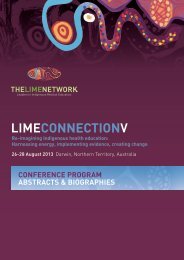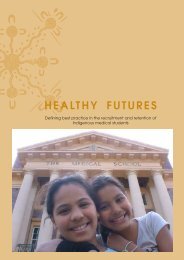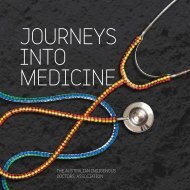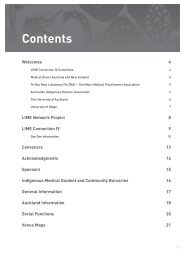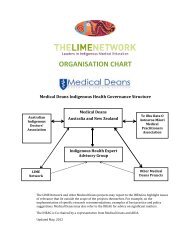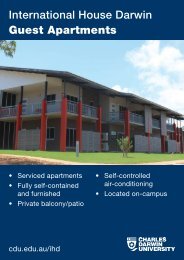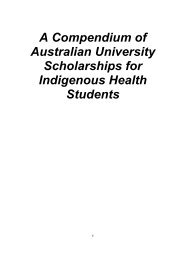abstracts and bios cover_final.indd - LIME Network
abstracts and bios cover_final.indd - LIME Network
abstracts and bios cover_final.indd - LIME Network
You also want an ePaper? Increase the reach of your titles
YUMPU automatically turns print PDFs into web optimized ePapers that Google loves.
Ms Kerry TaylorKerry is a Senior Lecturer at the Centre for Remote Health, Alice Springs. She hasworked in Central Australia since 1988 across a range of roles <strong>and</strong> organisations.For the past decade she facilitated clinical experiences for undergraduate nurses inrural <strong>and</strong> remote venues <strong>and</strong> coordinated Indigenous health topics. She is now withthe Centre for Remote Health in Alice Springs as coordinator of Context of RemoteHealth <strong>and</strong> Indigenous student support lecturer. Kerry is soon to <strong>final</strong>ise her PhD study into interculturalcommunication involving Indigenous First Language speakers in health care settings.Community partnership research informing the undergraduate ‘Hauora Māori’curriculumDr Tristram Ingham 1 , Ms Bernadette Jones 2 , Ms Bridget Robson 31. Lecturer, Clinical Research Fellow, Department of Medicine, University of Otago, Wellington2. Lecturer, Research Fellow, Senior Research Nurse, Department of Medicine, University of Otago,Wellington3. Director, Hauora Māori Curriculum, Senior Lecturer, Director Te Rōpū Rangahau Hauora a EruPōmare, University of Otago, WellingtonAbstractMāori suffer significant inequalities in terms of asthma morbidity. We aimed to explore the experiences of theMāori community in both managing asthma in children <strong>and</strong> interacting with the health system - to inform ourHauora Māori (Māori Health) curriculum.The three-year qualitative project obtained rich descriptions of the experiences of parents; the challenges <strong>and</strong>difficulties they faced both managing asthma, <strong>and</strong> seeking care from medical professionals. These findingswere integrated into our Hauora Māori curriculum for undergraduate medical students. We identified severalbarriers to accessing effective asthma healthcare for Māori, including medical professionals attitudes/behaviours: patients feeling ‘judged’; overly-technical explanations from doctors; <strong>and</strong> a lack of an holisticapproach to asthma care. Our teaching module provides an opportunity for students to reflect on the practicesthey have seen in their clinical placements <strong>and</strong> develop strategies to avoid these behaviours in their ownpractice.Through strategic partnerships with Māori health providers to co-develop <strong>and</strong> participate in all stages ofthe research, <strong>and</strong> teaching curriculum. Feedback of research data directly into the curriculum facilitatesgreater reflexivity of the teaching curriculum to the specific needs <strong>and</strong> aspirations of the community. Suchpartnerships provide opportunities for Māori health providers, <strong>and</strong> communities, to have their voices heard<strong>and</strong> integrated directly into the undergraduate curriculum.Presenters: Dr Tristram InghamTristram Ingham (Ngāti Kahungunu, Ngāti Porou) graduated Medicine from University ofOtago in 1997. He worked for Capital <strong>and</strong> Coast District Health Board before joining theUniversity of Otago in 2002. He worked as clinical researcher <strong>and</strong> principal investigatoron a number of clinical <strong>and</strong> epidemiological studies for the Department of Medicine withfocus on respiratory health <strong>and</strong> inequalities, <strong>and</strong> currently lectures for the Hauora Māoricurriculum.67



